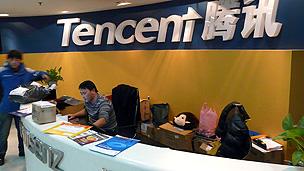Kevin Dai: Comsenz founder preferred programming to people
- Published
Computer programming was like a native language for Kevin Dai, but when he started his company he had to work on his communication skills
Every day millions of Chinese web users discuss life on bulletin boards and internet forums powered by Comsenz social networking software.
Kevin Dai, now 30, founded Comsenz a decade ago when he was still at university in China.
Comsenz caught the eye of US investors such as Google and venture capital firm Sequoia Capital, and in August last year one of China's biggest technology companies, Tencent, bought Comsenz. Reports suggest Tencent paid anything from $45m to $60m (approximately £29m-£38m).
Kevin may now be an employee, but he's still committed to the company he founded.
Teen talent
He first showed a talent for programming - and making money - when he was a teenager at junior middle school in the 1990s in the north-east of China.
Few people then knew much about computers or the web in China, so Kevin taught himself. Programming, he says, was like a "native language" for him. He entered a national information technology competition and came in the top three.
He then wrote an article about new programming techniques and speculatively sent it to the editor of one of China's leading computer magazines.
It was accepted - and the publication paid Kevin more than 200 yuan (£20).
Before long he was writing an article a week and earning about 700 yuan a month - about the same as his parents, who were university professors.
College experience
Kevin started an electronic engineering degree at one of China's top academic institutions in 2000, but his heart was not in it.
Programming was his first love and he thought he could demonstrate his skills to potential employers by starting a software company.
There were few Chinese websites and little Chinese content on the internet a decade ago, but bulletin boards and internet forums were starting to thrive. Kevin was hooked.
"I enjoyed the experience very much," he says. "I can freely talk to many strangers and talk about the things we have interest in."
But he found bulletin boards often could not cope during peak hours. The software was too complicated. "If we have many, many features on a bulletin board, they will reduce the speed of the web page."
So he set about writing simple, elegant and reliable software that concentrated on the things that consumers most need and want to do on a forum.
"The first one is writing a message, and the second one is reading a message; the third one is replying to a message," he says. "That's three important features, and other ones are, maybe, useless."
Studying took second place to business. Kevin continued to write magazine articles to fund his new venture and for the first three years it was just him, a computer, and two telephones - one for sales and one for customer support.
Business growth
Finally the time came to hire his first member of staff. By then, Comsenz and its Discuz! software were well-known and pretty successful.

Comsenz's first office was small and gloomy, but since then the company has grown
But Kevin's office in Beijing was small, dirty and gloomy and the first job applicant was suspicious when she arrived for interview.
"The candidate said: 'Is this the company of Comsenz?' I said: 'Yes'. And she says: 'Are you a liar?'"
Despite that embarrassing false start, before long Kevin was employing 10 staff. But he wasn't really managing them.
"I am a programmer," he says. "I don't have many skills to communicate... I feel safe writing programmes because [programmes are] reliable."
Then, one employee complained that he spent all his time in his office writing code. "She said: 'You do not talk to us. We feel lonely.'"

Mr Dai forced himself to become more outgoing and made efforts to improve his communication skills
So he forced himself to become more outgoing. Improving his people skills was vital: he needed to hire experienced senior managers to sustain the company's expansion.
A little humility goes a long way in a traditional hierarchical society like China, where young people are expected to defer to the older generation and not to be their bosses.
Kevin's next goal is to become an angel investor - using his wealth, knowledge and experience to help young entrepreneurs to realise their dreams.
His advice is to be prepared for a very different lifestyle to the one you might have if you just worked for someone else. "You should not worry about failure," he adds.
He says: "If you feel that you have nothing to lose, then you will be prepared to start your own business."